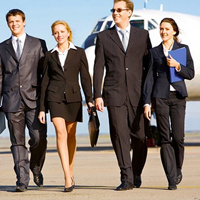Although it could reasonably be expected that the current economic downturn would lead to a reduction in business travelling, this doesn't appear to have been the case. However, the recession has caused companies to reconsider not only how they travel but the reasons why they do so.
Of course, perennial considerations such as cost and time remain key, but recent evolutions in both transport links and technology have raised the possibilities of whole new ways of doing business. The ideal, of course, is not only being able to journey to the other end of the country, but to be just as productive when traveling there as a day in the office. The reality may be slightly different, but there's no doubting that smart business travel can allow your company to really maximise its potential.
A recent survey conducted by Barclaycard Commercial quizzed more than two thousand businesses about their travel preferences and habits. Three-quarters of respondents expected to travel more or the same in 2009 as 2008, with half of those who expected to travel more citing business expansion as the reason.
"The fears of recession have not deterred some businesses from expansion - the survey shows positive signs for business expansion in both the UK and globally," says Neil Radley, managing director of Barclaycard Commercial.
Indeed, many companies have realised that, despite the downturn, money spent on travel often makes good business sense in the long-term. However, as is the currently the case with every facet of a business, in the short-term at least, travel costs are being scrutinised more closely than ever before.
Taking flight
It would be hard to argue that, if time is a factor in your journey, air travel is not the most desirable method. And it's one that continues to be popular: although passenger numbers have declined since the recession began, the Department for Transport offers a more positive outlook. It estimates that, between 2010 and 2030, passenger numbers traveling through the UK's airports will grow from 270 to 464 million. Keen to capitalise on this burgeoning market, increasing numbers of both carriers and airports are offering business users facilities tailored to their every need.
The majority of airlines now offer SME packages, and are keen to promote their benefits for business travelers. bmi’s Company Rewards Scheme for instance, was introduced in the spring of last year. "This new SME offering is all-singing and all-dancing," says Julie Jones, Head of Business Sales at bmi. "Not only does it allow clients to manage their accounts online, but there is no minimum entry level, which means customers earn points for every flight and can then claim free tickets or a cash rebate."
Airlines have harnessed this new technology to make the lives of business travelers easier in a range of other ways. Utilising the rise of personal digital technology, ‘paperless boarding' allows customers to keep flight information - including boarding passes - on their handheld device. Not only does this allow passengers to check in themselves, it also helps cut down on the lengthy queues which every traveler has experienced.
As global markets expand and shift, many airlines are also introducing and adapting their routes to capture new business. Moscow and Saudi Arabia are among the regions seeing increased business transit, but not all business travelers are venturing so far afield: increasing amounts of internal flights are also being scheduled. It's now possible to travel from London to nearly anywhere in the UK within the space of just a few hours. Despite worries about climate change and the impact of ever-growing airports, this still remains arguably one of the most desirable way to get around the country.
Airlines have harnessed this new technology to make the lives of business travelers easier
Driving ambition
Despite the rise of the budget airline, there remains something glamorous about flying to an exotic location on the other side of the world. As necessary as business life makes it, however, it's difficult to apply the same sense of style and excitement to road travel. Indeed, soaring fuel prices and gridlocked routes often make getting around the country by car a necessary but painful evil.
There are, however, ways in which business travellers can make the most of their time on the road. For many businesses, car-sharing schemes are a viable solution, allowing colleagues to spend time with each other away from the usual office environment. The rental sector is also getting in on the act: earlier this year car hire firm Avis announced a scheme to offer 1,500 free car rentals to small businesses, and have also offered a series of money-saving tips through their website, www.wetryharder.co.uk.
On the right track
In the short-term, however, both air and road travel have their drawbacks. Rising costs in fuel and taxes mean that prices have soared, making train travel - while still expensive - an increasingly viable option.
Increased investment seems to be paying off, too: Network Rail (NR) recently announced that it would electrify nearly 300 miles of Britain's busiest railway track over the next decade after the government gave its approval to a £1.1bn programme. Journey times from London to Scotland would be also be massively reduced through the proposed construction of a £34bn high-speed rail line, using a route preferred by NR. A detailed study found that passengers would be able to reach Glasgow from the capital in just two hours 16 minutes, down from the current four and a half hour journey time.
The improvements are not all outside the train, however. All major rail operators now offer high-speed internet access in their business class carriages, meaning that completing work on the way to and from the office is a very real option. But as society becomes ever-more focused on technology, the all-important question of cost again comes to the fore.
Rail fares are rising more than any other form of passenger transport, with commuters in one Leicestershire town recently facing an astronomic 145% price rise on peak tickets to London. Headlines like this can only make business travelers re-examine their need to travel, and it's the relentless pace of technological change which would appear to offer a genuinely new way of solving the perennial problem of getting from A to B.
New technology
While traditional means of travel focus on the movement of business people from one destination to another, innovations such as video conferencing, internet messaging and Skype now seem to offer companies the genuine possibility of bypassing these transport networks entirely.
Indeed, it is not so much that these technologies are new, rather that they are increasingly reliable enough - and affordable enough - to be of practical use in a business setting. Video-conferencing, for instance, was widely touted as the future of business meetings, yet corporate networks lacked the bandwidth to handle anything approaching real-time communication. Audio and video were often out of sync, rendering participant's words and lips hopelessly misaligned and overloading IT departments the world over. When combined with freeze-frames and dropped connections, frustrated participants often resorted to boarding planes to reconvene for tried-and-tested face-to-face meetings.
The current situation has improved, but there's still some way to go before the technology fully meets the needs of its users. High quality communications hardware remains the preserve of the top end of the market, and SME owners who don't want to pay a fortune are often finding that the end product is not satisfactory.
"On the occasions that we've tried video conferencing, you couldn't focus on the speaker and the sound can keep dropping out and re-joining," says Julian Baines, Group CEO of Cardiff-based BBI Holdings. "It cost £1200 for eight hours, and it's absolutely not a substitute for a face-to-face meeting. After this one experiment we've decided not to use this again, and we're reverting back to face-to-face meetings as effective communication was simply impossible using the technology on offer."
The Barclaycard survey results echoed the thoughts of Mr Baines, with 85% of respondents thought that thought face-to-face meetings are better for business than using technologies like video/web conferencing. Julie Jones from bmi agrees: "Meeting face to face is very important, and is often much more productive than via email or video conferencing, which is just not the same as sitting in front of a client and forming a business relationship," she stresses. "Some clients, especially those in new and emerging markets, want to know more about you as an individual before they will do business with you."
So with technology not yet able to offer travelers an escape from the realities of mass transit, companies will need to take stock of today's tough economic climate. With global trade putting more and more pressure on businesses to interact with markets thousands of miles away, it has never been more important to plan for the future.







